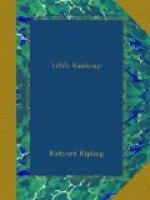‘And thou art our father and our mother,’ broke in Khoda Dad Khan with an oath. ’What shall we do, now there is no one to speak for us, or to teach us to go wisely!’
’There remains Tallantire Sahib. Go to him; he knows your talk and your heart. Keep the young men quiet, listen to the old men, and obey. Khoda Dad Khan, take my ring. The watch and chain go to thy brother. Keep those things for my sake, and I will speak to whatever God I may encounter and tell him that the Khusru Kheyl are good men. Ye have my leave to go.’
Khoda Dad Khan, the ring upon his finger, choked audibly as he caught the well-known formula that closed an interview. His brother turned to look across the river. The dawn was breaking, and a speck of white showed on the dull silver of the stream. ‘She comes,’ said the man under his breath. ‘Can he live for another two hours?’ And he pulled the newly-acquired watch out of his belt and looked uncomprehendingly at the dial, as he had seen Englishmen do.
For two hours the bellying sail tacked and blundered up and down the river, Tallantire still clasping Orde in his arms, and Khoda Dad Khan chafing his feet. He spoke now and again of the district and his wife, but, as the end neared, more frequently of the latter. They hoped he did not know that she was even then risking her life in a crazy native boat to regain him. But the awful foreknowledge of the dying deceived them. Wrenching himself forward, Orde looked through the curtains and saw how near was the sail. ‘That’s Polly,’ he said simply, though his mouth was wried with agony. ’Polly and—the grimmest practical joke ever played on a man. Dick—you’ll—have—to—explain.’
And an hour later Tallantire met on the bank a woman in a gingham riding-habit and a sun-hat who cried out to him for her husband—her boy and her darling—while Khoda Dad Khan threw himself face-down on the sand and covered his eyes.
II
The very simplicity of the notion was its charm. What more easy to win a reputation for far-seeing statesmanship, originality, and, above all, deference to the desires of the people, than by appointing a child of the country to the rule of that country? Two hundred millions of the most loving and grateful folk under Her Majesty’s dominion would laud the fact, and their praise would endure for ever. Yet he was indifferent to praise or blame, as befitted the Very Greatest of All the Viceroys. His administration was based upon principle, and the principle must be enforced in season and out of season. His pen and tongue had created the New India, teeming with possibilities—loud-voiced, insistent, a nation among nations—all his very own. Wherefore the Very Greatest of All the Viceroys took another step in advance, and with it counsel of those who should have advised him on the appointment of a successor to Yardley-Orde. There was a gentleman




